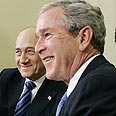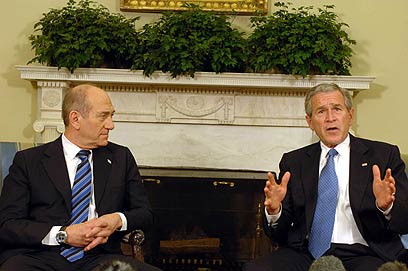
Bush to Olmert: No international peace convention
In meeting between US president and Israeli prime minister, officials mainly discuss Iranian issue. Addressing Palestinian issue, both leaders say they favor direct negotiations over international convention
"There will be no international convention on the Palestinian issue which will replace direct negotiations," Olmert said, quoting Bush.
"If a situation can be created in which moderate countries will encourage the Palestinians to enter negotiations with Israel, I will view it positively and will be very pleased," he added.
The prime minister also claimed that President Bush did not pressure him to moderate the Israel Defense Forces' military activity in the Gaza Strip, contrary to remarks made by an American diplomat a few days before the summit, who said President Bush would call on Olmert to increase operations on the diplomatic level and less on the military level.
Olmert noted that Israel and the United States exchanged ideas in the past few weeks in order to find a breakthrough for a possible dialogue according to the Road Map.
The prime minister added that during his meeting with the American president ideas were raised on how to strengthen the moderate forces in the Palestinian Authority. One of the ideas raised was the issue of transferring weapons to Fatah members in the Gaza Strip.
The issue of releasing Palestinian prisoners in exchange for kidnapped soldier Gilad Shalit was not raised in the meeting with Bush.
The prime minister left the meeting satisfied, mainly because of the part which dealt with Iran.
"The Iranian part of our talk was very comprehensive, very serious and very significant. I can definitely say that I left with an extraordinary feeling from this talk. The president has been saying for some time now that he is in favor of a dialogue with the Iranians, as long as the technological threshold conditions exist to prevent them from enriching uranium," the prime minister said.

Bush and Olmert at White House (Photo: GPO)
Olmert also referred to the interviews he gave to US media, in which he did not reject a dialogue between Washington and Tehran.
"I said I am in favor of a compromise, if this compromise prevents them from reaching this threshold. I have no special desire to be dragged into a confrontation with the Iranians," the prime minister said, refusing to refer to a possibility of an american military operation in Iran.
He stressed, however, that "the conversation between the president and myself dealt with a variety of possibilities to respond to the Iranian issue."
Olmert tried flattery, but embarrassed Bush
The meeting between Bush and Olmert took place in the Oval Office and lasted about 50 minutes. After the meeting and subsequent press conference, the two leaders had a lavish luncheon with their respective entourages.
Olmert recounted, "Somewhere between the fish and the rack of lamb, Bush showed interest in the state of the Israeli economy. I told him about the positive balance of payments, and how we are using budget surplus to finance the war expenses. He also showed interest in the financial arrangements in Israel."
The Lebanese issue also came up in conversation between the two and the possibility of Olmert meeting Lebanese Prime Minister Fouad Siniora was considered.
"I have yet to receive a response about this possibility," revealed Olmert to the reporters accompanying him on his trip to the United States. "I wish Siniora success in overcoming the crisis. We are following developments in Lebanon. It would be unrealistic to talk about a meeting with Siniora right now while he is fighting for the survival of his government."
In his statements to the reporters, Olmert referred to the resignation of Brigadier General Gal Hirsch. "I am very sorry about the resignation. He is a courageous fighter with a record of fighting on the front lines of Israel's battles for many years. He showed exceptional leadership skills.
"I am not familiar with Major General (res.) Doron Almog's report. The army will need to study it and provide answers. I also don't recognize calls for the chief of staff to resign and I don't plan on dealing with this. The military echelons are the ones who have to discuss the report, not me," Olmert explained.
During the press conference after the meeting, Olmert tried to flatter Bush, but instead embarrassed him. Olmert said that he has no doubt that the American operation in Iraq is a dramatic and positive contribution to stability in the Middle East, adding that American presence in Iraq has strategic importance to Israel and that US withdrawal would be significant.
Olmert continued saying that the American invasion of Iraq had strategic value for Israel and the moderate Arab states, saying that the impact of American withdrawal from Iraq must be taken into account. These comments came five days after Bush's Republican Party suffered a humiliating defeat in the elections to Congress largely due to a campaign in favor of getting out of Iraq.










